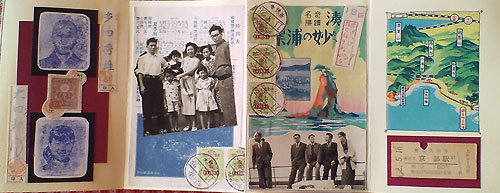
Collaged pages using antique documents
Yesterday, Greg & I explored his huge collection of ephemera and put together some collaged pages. We had an interesting discussion about whether it is OK to use old things and in the process of using them, destroy them or their context.
These pages I did are a good example. They include two old photos, a telephone line transfer form dated 1953, a 66 year old train ticket from Kyoto, and a tourist pamphlet from the seaside resorts of Chiba prefecture. Did I add value by turning them into something else? Or did I destroy a bit of a stranger’s personal history (and thus a minuscule portion of the world’s historical record)?
It was difficult to make those first cuts into the telephone form, even though Greg has a total of ten of them and they are obviously long-forgotten beuracracy. They were interesting to examine and to imagine what the process was like and why Tada-san sold his phone line way back when.
Now that form’s been reduced to a series of slices - names, date-canceled duty stamps, name stamps - and worked into something that’s vaguely artistic and divorced of its original context. Is it better off in a travel collage tucked into Greg’s Moleskine and displayed online? It’s different. Maybe not better. But maybe not worse, either.
Some collage people scan and reproduce their old documents. That’s not a bad idea for really precious or personal things. But it’s not quite adequate to print out a new copy of a scanned photo.
I loved working with the old paper yesterday. The texture of old stuff can’t be reproduced very easily. The hard, curled-up edges of the 50 year old photos, the weight of the paper ticket, the bone-dry feeling of the form, acid-brittle newsprint of the tourist pamphlet. Those were exciting to manipulate. Now they are cut up and glued down, never again to be enjoyed whole, the way I did yesterday.
I feel a little sad for the objects I destroyed. But maybe I’ve extended their memory by incorporating them into something new. I don’t know. What do you think?
Posted by kuri at July 07, 2007 09:17 AMWe always edit our own reality.
Things heard — seen — felt — long ago, and yesterday, inform our interaction with today.
Is that zen?
—ml
It really depends on what you are “editing”. If it is something that has enormous value in its own right then of course it would be wrong to cut it up. But if these things would have been discarded due to either a glut of them or seemingly insignificance then you are breathing new light into something that may never see the light again or be trashed.
I guess it pays to do some research first - which you seem to have done.
Posted by: T on July 7, 2007 09:11 PMart is a forge.
now you know why forge has the dual meaning of making something into something else as well as immitated.
there is no reaon to cereralize on this.
Posted by: niji on July 8, 2007 05:19 PMI feel much the same. I feel the pain of cutting into old things, removing their original connection to their context. And yet I cut them because they are precious to me and their context is already long gone, and the worst thing that could happen to them is that they be forgotten and destroyed. So my little destruction and the rebirth I offer seems the lesser evil.
Posted by: j-ster on July 9, 2007 10:39 AMIt’s unfortunate that when dealing with common stuff like this, for the most part time and obscurity has caused it to lose it’s relevance. By cutting them up and like a phoenix giving rebirth to them, you’ve given them renewed relevance. Who knows, in 70 years, the moleskines may become part of someone else’s neo-collage, or whatever form art takes at that point in time.
Posted by: iHorner on July 10, 2007 10:51 AM